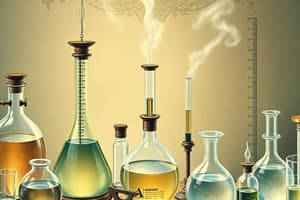Podcast
Questions and Answers
What is the primary goal of analytical chemistry?
What is the primary goal of analytical chemistry?
- To alter the physical state of chemical substances in a sample.
- To identify chemical substances in a sample. (correct)
- To destroy chemical substances in a sample.
- To create chemical substances in a sample.
Which technique in analytical chemistry involves separating analytes based on their affinity for a stationary phase?
Which technique in analytical chemistry involves separating analytes based on their affinity for a stationary phase?
- Spectroscopy
- Distillation
- Titration
- Gas chromatography (correct)
What is the main purpose of using spectroscopy in analytical chemistry?
What is the main purpose of using spectroscopy in analytical chemistry?
- To determine the mass of a substance
- To separate components of a mixture
- To analyze interactions between matter and electromagnetic radiation (correct)
- To measure the volume of a solution
In analytical chemistry, what is the role of thin-layer chromatography (TLC)?
In analytical chemistry, what is the role of thin-layer chromatography (TLC)?
How do chemists use the information obtained from analytical chemistry?
How do chemists use the information obtained from analytical chemistry?
What is the primary function of a spectrometer?
What is the primary function of a spectrometer?
What is the main purpose of ultra-high-performance liquid chromatography (UHPLC)?
What is the main purpose of ultra-high-performance liquid chromatography (UHPLC)?
What is the role of mass spectrometry (MS) in analytical chemistry?
What is the role of mass spectrometry (MS) in analytical chemistry?
What is the main focus of metabolomics in analytical chemistry?
What is the main focus of metabolomics in analytical chemistry?
What are some challenges faced by chemists in analytical chemistry according to the text?
What are some challenges faced by chemists in analytical chemistry according to the text?
Flashcards are hidden until you start studying
Study Notes
Delving into the World of Analytical Chemistry
Analytical chemistry is a captivating field that explores the separation, identification, and quantification of chemical substances. It's akin to a detective's pursuit, where chemists use a multitude of techniques and tools to analyze, understand, and solve mysteries in a test tube. Let's uncover some fundamental concepts and modern advancements in this ever-evolving discipline.
The Purpose of Analytical Chemistry
Analytical chemistry is crucial for various industries, from pharmaceutical and environmental sciences to food safety and forensics. Its goal is to gain precise and detailed information about chemical substances in a sample, including their identity, composition, and concentration. Chemists use this information to develop innovative solutions, monitor quality, and address environmental concerns.
Fundamental Tools and Techniques
In analytical chemistry, the tools and techniques are as diverse as the substances being analyzed. Some of the most commonly used methods include:
-
Chromatography: Separation techniques that use a stationary phase and a mobile phase to separate analytes based on their affinity for the stationary phase and their ability to move through it. Common chromatographic methods include gas chromatography (GC), liquid chromatography (LC), and thin-layer chromatography (TLC).
-
Spectroscopy: A collection of techniques that analyze interactions between matter and electromagnetic radiation. Spectrometers are used to record the intensity of the radiation absorbed, emitted, or scattered by a sample. Common spectroscopic methods include ultraviolet-visible spectroscopy (UV-Vis), infrared spectroscopy (IR), and nuclear magnetic resonance (NMR) spectroscopy.
-
Sensors and biosensors: Devices that convert chemical information into electrical signals, which can be further processed and analyzed. These sensors can be used for real-time monitoring and in situ analysis.
Modern Advancements
In recent years, the field of analytical chemistry has witnessed significant advancements in various areas, including:
-
Ultra-high-performance liquid chromatography (UHPLC): This high-pressure, high-speed technique allows for faster separations with higher efficiency and increased sensitivity.
-
Mass spectrometry (MS): A powerful analytical tool for identifying and quantifying substances in a sample using the mass-to-charge ratio of ions. Coupling MS to chromatographic techniques has resulted in high-performance liquid chromatography-mass spectrometry (LC-MS) and gas chromatography-mass spectrometry (GC-MS) instruments.
-
Metabolomics: An emerging field that studies the complete set of metabolites in a biological system, providing valuable insights into cellular processes and disease states.
-
Electroanalysis: An analytical technique that measures the current-voltage response of a chemical system and provides useful information about the distribution of charged species.
Challenges and the Future
Analytical chemistry is at the forefront of solving complex issues, such as detecting trace amounts of pollutants in the environment or identifying novel pharmaceutical compounds. However, chemists face several challenges, including:
- The need for more sensitive and selective analytical methods
- The development of green and eco-friendly techniques
- The expansion of the field into other areas, such as omics research
The future of analytical chemistry looks bright as chemists continue to push the boundaries of what is possible and work towards more efficient and environmentally friendly techniques. With the ongoing development of novel instruments and emerging fields, the future of analytical chemistry promises to be even more exciting than the past.
Studying That Suits You
Use AI to generate personalized quizzes and flashcards to suit your learning preferences.




